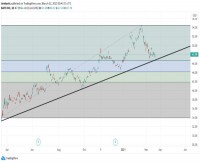|
Opalesque Industry Update - The European Commission welcomes the political agreement reached by the European Parliament and EU Member States today on new rules on disclosure requirements related to sustainable investments and sustainability risks. The agreed rules will strengthen and improve the disclosure of information by manufacturers of financial products and financial advisors towards end-investors. First proposed by the Commission in May 2018 as part of the Sustainable Finance Action Plan and the Capital Markets Union, these rules are an integral part of the EU efforts, under the EU's sustainable development agenda and the carbon neutrality agenda, to connect finance with needs of the real economy. They also support the 2012 United Nations' Sustainable Development Goals and the 2016 Paris Climate Agreement targets. The new regulation sets out how financial market participants and financial advisors must integrate environmental, social or governance (ESG) risks and opportunities in their processes, as part of their duty to act in the best interest of clients. It also sets uniform rules on how those financial market participants should inform investors about their compliance with the integration of ESG risks and opportunities. By so doing, it addresses information asymmetries on sustainability issues between end-investors and financial market participants or financial advisors. The availability of information is crucial to the integration of risks related to the impact of ESG events on the value of investments, for example in assets located in flood-prone areas. The regulation also requires the disclosure of adverse impact on ESG matters, such as in assets that pollute water or devastate bio-diversity, to ensure the sustainability of investments. Valdis Dombrovskis, Vice-President responsible for the Euro and Social Dialogue, also in charge of Financial Stability, Financial Services and Capital Markets Union, said: "The EU is fully committed to implementing the Paris agreement and leading the global fight against climate change. Thanks to today's agreement, we are making sure that the financial system works towards this goal. The new rules on disclosures will enable investors and citizens to make more informed choices so that their money is used more responsibly and supports sustainability." Vice-President Jyrki Katainen, responsible for Jobs, Growth, Investment and Competitiveness, said: "The Paris Agreement is a massive investment opportunity. We need to seize it. Today's agreement will help Europe's financial sector position itself as a leading global destination for investments in green technologies." The new regulation is built around three main pillars: Elimination of greenwashing (unsubstantiated or misleading claims about sustainability characteristics and benefits of an investment product) and an increase of market awareness on sustainability matters; Regulatory neutrality: the rules introduce a disclosure toolbox to be applied in the same manner by different financial market operators. The three European Supervisory Authorities (ESAs), and in particular the Joint Committee of the Authorities, will ensure further convergence and harmonisation of disclosures in all the sectors concerned. Level playing field: the regulation covers the following financial services sectors: (i) investment funds; (ii) insurance based investment products (life insurance products with investment components available as individual retail life policies as well as group life policies); (iii) private and occupational pensions, (iv) individual portfolio management; and (v) both insurance and investment advice. Background The EU and governments around the world committed to the objective of a more sustainable economy and society when they adopted the Paris Agreement on climate change and the UN 2030 Agenda for Sustainable Development. The EU is already making a difference thanks to the EU 2030 Energy and Climate framework, the Energy Union, the Circular Economy Action Plan, and the EU implementation of the 2030 Agenda for Sustainable Development. To achieve more sustainable growth, everyone in society must play a role. The financial system is no exception. Re-orienting private capital to more sustainable investments requires a comprehensive rethinking of how our financial system works. This is necessary if the EU is to develop more sustainable economic growth, ensure the stability of the financial system, and foster more transparency and long-termism in the economy. On 24 May 2018 the Commission presented a series of legislative measures that follow up to the first ever EU Action Plan on Financing Sustainable Growth. Today's agreed measures are part of that package, together with the EU rules for the creation of benchmarks for low-carbon investment strategiesagreed on 25 February by the European Parliament and Member States. The Commission is working with the co-legislators with the objective to reach an agreement on the remaining part of the package: the Commission proposal to establish a unified EU classification system ('taxonomy') of sustainable economic activities.
|
Industry Updates
European Commission agrees to sustainable investment disclosure framework
Monday, March 11, 2019
|
|





 RSS
RSS







